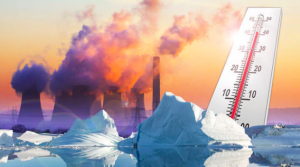
Source: Getty Images
With a warming Earth, anti-vaccine campaigns, and the threat of nuclear war, it’s understood that there’s a good chance we will bring about our own destruction. But it’s pretty hard to not wonder what the probability of human extinction in any given year based solely on natural disasters, the odds could be as high as 1 in 14,000.
Honestly, it’s hard to imagine that one day this Earth will exist and thrive without the existence of humanity, but out of all the species that’s ever existed over 99% have gone extinct. Yes, human activity is one of the main reasons why extinction rates are increasing but it can also be caused by environmental changes, evolutionary competition. or catastrophic natural events.
Researchers at the Future of Humanity Institute at the Univesity of Oxford were curious to find the highest probability of human extinction in any given year. Considering our species, Homo sapiens has existed at least 200,000 years, they concluded that the probability of humanity going extinct from a natural disaster is almost guaranteed to be less than 1 in 14,00 and most likely less than 1 in 87, 000.
These numbers were estimated by excluding risks from global warming or nuclear warfare and instead focused on natural risks that we and our ancestors have faced over our time on Earth. The rate is based on the fact that humanity has survived up until now.
Obviously, there are limitations to this analysis. The study only looks at risks by natural phenomena, which haven’t changed over the last 200, 000 years. “200 000 years of track record of not going extinct from nuclear war doesn’t count for much”, Tody Ord, one of the authors of the paper pointed out to Vox. “since we only invented nuclear weapons 70 years ago”. What about risks from human-related sources?
This analysis isn’t all without value, it helps us to identify and prioritize the bigger risks we face. This study concludes that we are unlikely to go extinct due to natural disasters that we are all currently vulnerable to. But no such conclusions can be said about the risks that our ancestors did not have to deal with, such as climate change and nuclear warfare. It acts as a gentle reminder that our fate is mostly in our own hands.
A gentle reminder that our fate is mostly in our own hands.
-Cindy Liu
